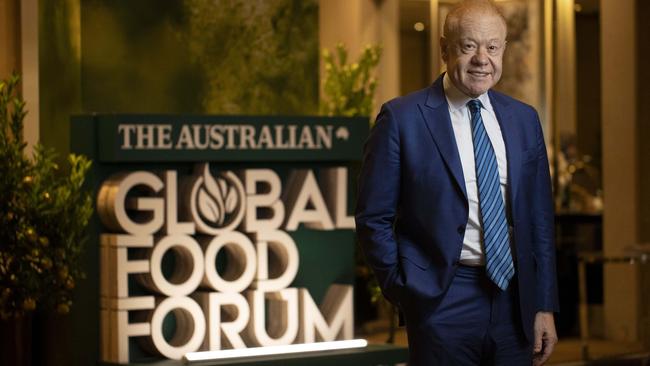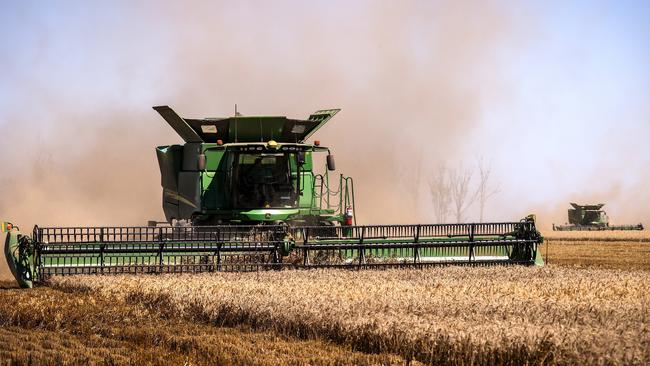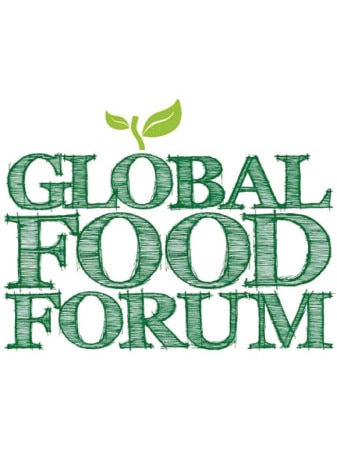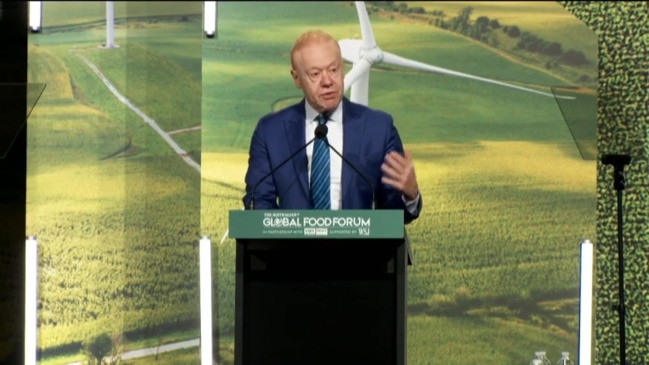Australian food export targets should be $100bn: Anthony Pratt
Australian food exports should reach $100bn and the industry must continue to engage with China while also building new relationships in India and the United Kingdom.

Australia should set a new short-term goal of reaching $100bn in annual food exports, while the food industry must continue to engage with China and build new relationships in India and Britain, according to billionaire paper, packaging and recycling magnate Anthony Pratt.
Record volumes of Australian wheat, barley, canola, cotton and sorghum are expected to be exported in 2022-23 as the annual production of agricultural goods is forecast to eclipse $90bn for the first time.
The Australian Bureau of Agricultural and Resource Economics and Sciences’ latest commodity outlook released in March claimed that the gross value of farmed goods in 2022-23 would surpass last year’s record by $2bn following record winter crop harvests in Victoria, South Australia and Western Australia.
In his address to The Australian and Visy’s eleventh annual Global Food Forum in Melbourne on Thursday, Mr Pratt will laud the increase in Australia’s food exports from $29bn in 2013 – the first year of the food forum – to the current annual $70bn.
ABARES believes the value of agricultural exports is set to reach $75bn in the year ahead, the first time they have risen above $70bn, due to large grain and oilseed harvests.
“Our agri-food production sector is now the nation’s highest employer, providing 600,000 jobs, many in country areas,” Mr Pratt will say at Thursday’s forum.

“Food production is not only our biggest industry, but it’s our biggest manufacturing sector, and I’m pleased to say that there are now 1500 more food and beverage factories in Australia than before we started this conversation.
“I am now convinced that $100bn of food exports is a realistic short-term target.
“Sadly, the Ukraine war has forced a big shock on the global food system because Ukraine is one of the world’s six ‘food baskets’, which supply three-quarters of the world’s food.
“The good news is that Australia also happens to be one of those big ‘food baskets’.
“But we can’t rest easy.”
While China is sourcing bulk commodities such as soybeans, grains and cotton from Brazil and the US, it continues to look to Australia for higher-value, clean and green, and healthy food.
China remains Australia’s third-largest export market for beef, while the trade of dairy cattle to China and Japan is worth more than a quarter of a billion dollars annually.
Over the past year, the Albanese government has stabilised Australia’s relationship with China, despite ongoing bans on lobster imports and the massive wine tariffs imposed by the Chinese in March 2021 that almost completely shut down a trade worth $1.2bn annually.
“China is still Australia’s biggest agricultural export market, worth $13bn last year – double what it was 10 years ago – and our government’s recent efforts are great, so China is going to remain important for us,” Mr Pratt will say.
“Congratulations to ministers [Penny] Wong, [Don] Farrell, and [Murray] Watt for their great soft diplomacy.”

Australia has also secured 11 new free-trade agreements in recent years, including the landmark Australia-India Free Trade Agreement that came into effect in December.
Indian Prime Minister Narendra Modi spent two days in Sydney this week and held meetings with key business people, including Gina Rinehart – who has vast rural holdings increasingly focused on high-value Wagyu beef production – and GrainCorp chief executive Robert Spurway.
“The other huge opportunity just to the north of us is India. India is now our fourth-biggest export market and our 2022 FTA means 85 per cent of our goods are now tariff-free,” Mr Pratt will say.
According to ABARES, in 2021-22 Australia exported $772m of agricultural, fisheries and forestry products to India, or just 1.1 per cent of its total exports.
Mr Pratt will also say the new UK-Australia FTA would give Australian food exporters more access to the UK market than when Britain joined the Common Market.
But the executive chairman of the multinational Visy Group, whose US arm Pratt Industries is the fifth-largest packaging group in America, will warn that Australia is also facing increased competition from other food-producing nations.
“For example, while we’ve been hard at work negotiating FTAs, Brazil gained access to the Indonesian beef market and they’ve set their sights on other Asian markets, right in our back yard,” he will say.
“Chile has also stepped up to supply wine to the Chinese market, in our absence.”
The billionaire will also stress that Australia must continue to focus on being more efficient across the agricultural supply chain.
“Higher inflation means higher fertiliser and transport costs and rising interest rates make borrowing hard. Changing climate will also keep water supplies under pressure,” he will say.
“In our own business, we’re replacing styrene and single-use plastics with paper-based packaging.
“Australia is already renowned for safe food – so vitally important in a world increasingly suspicious of food substitution & dubious food quality.”
More Coverage







To join the conversation, please log in. Don't have an account? Register
Join the conversation, you are commenting as Logout